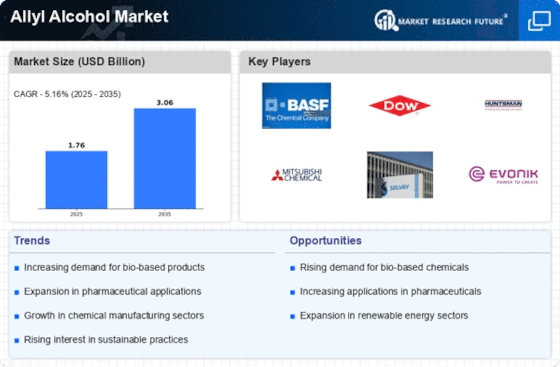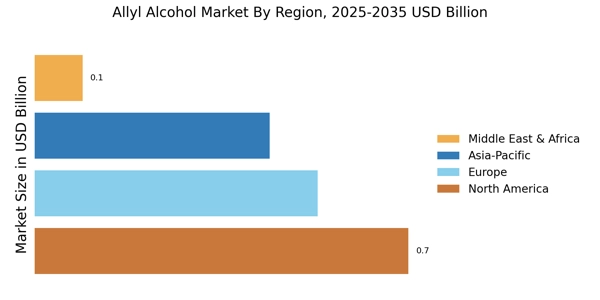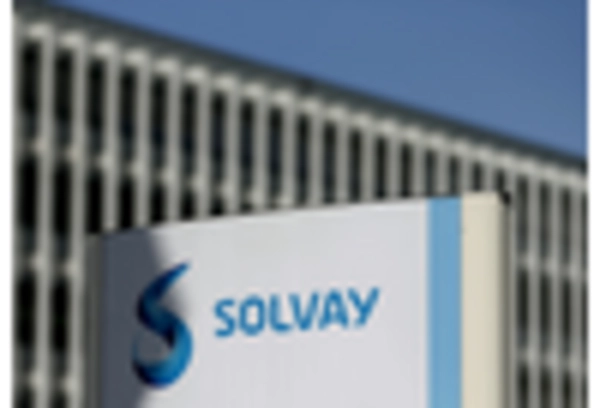Rising Environmental Regulations
The implementation of stringent environmental regulations is shaping the landscape of the Allyl Alcohol Market. Governments across various regions are increasingly focusing on sustainable practices and the reduction of hazardous substances in chemical manufacturing. This trend is prompting manufacturers to seek eco-friendly alternatives, including bio-based allyl alcohol. The market for bio-based chemicals is projected to grow significantly, with estimates suggesting a compound annual growth rate (CAGR) of over 10% through 2025. As a result, the demand for allyl alcohol derived from renewable resources is likely to increase, aligning with the regulatory push for sustainability and environmental responsibility within the Allyl Alcohol Market.
Growth in the Construction Industry
The growth in the construction industry is a significant driver for the Allyl Alcohol Market. Allyl alcohol is utilized in the production of various construction materials, including adhesives and sealants, which are essential for modern construction projects. The construction sector is projected to grow at a CAGR of around 5% through 2025, fueled by urbanization and infrastructure development initiatives. This expansion is likely to lead to an increased demand for allyl alcohol as a key ingredient in construction-related applications. As the construction industry continues to thrive, the Allyl Alcohol Market is expected to benefit from the heightened consumption of allyl alcohol in various construction materials.
Expansion of the Pharmaceutical Sector
The pharmaceutical sector's expansion is another crucial driver influencing the Allyl Alcohol Market. Allyl alcohol is utilized in the synthesis of various pharmaceutical compounds, including analgesics and anti-inflammatory drugs. The Allyl Alcohol Market is expected to surpass USD 1.5 trillion by 2025, driven by an aging population and increasing healthcare expenditures. This growth in the pharmaceutical sector is likely to create a heightened demand for allyl alcohol as a key raw material, thereby positively impacting the Allyl Alcohol Market. Furthermore, the ongoing research and development activities in drug formulation are expected to further enhance the utilization of allyl alcohol in pharmaceutical applications.
Increasing Demand for Specialty Chemicals
The rising demand for specialty chemicals is a pivotal driver for the Allyl Alcohol Market. Specialty chemicals, which are used in a variety of applications including coatings, adhesives, and plastics, are experiencing significant growth. The market for specialty chemicals is projected to reach approximately USD 1 trillion by 2025, indicating a robust expansion. This growth is largely attributed to the increasing need for high-performance materials in various sectors such as automotive, construction, and consumer goods. As a key intermediate in the production of these specialty chemicals, allyl alcohol is likely to see a corresponding increase in demand, thereby bolstering the overall market dynamics of the Allyl Alcohol Market.
Technological Innovations in Production Processes
Technological innovations in production processes are playing a vital role in the evolution of the Allyl Alcohol Market. Advances in catalytic processes and reaction engineering are enhancing the efficiency and yield of allyl alcohol production. For instance, the development of more effective catalysts can reduce energy consumption and lower production costs, making allyl alcohol more competitive in various applications. The market is witnessing a shift towards more sustainable and cost-effective production methods, which could potentially increase the availability of allyl alcohol. As these technologies continue to evolve, they are likely to drive growth within the Allyl Alcohol Market, enabling manufacturers to meet the rising demand more effectively.

















